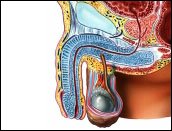Male Impotency
male sexual problems
What is impotence?
 Impotence or erectile dysfunction (ED) means not being able to get a good enough erection to have intercourse.
Impotence or erectile dysfunction (ED) means not being able to get a good enough erection to have intercourse.
Temporary impotence is very common indeed, particularly in younger men, and especially when they are either anxious, or have had too much to drink.
If you're having erection problems, bear these points in mind:
- the most common cause of temporary impotence is just anxiety - not some serious disease!
- impotence can be helped by medication, sex counseling, mechanical aids, or - very occasionally - surgical treatment.
- impotence may be a symptom of another, as yet undiagnosed, disease requiring treatment; the most common of these is diabetes.
The most common cause of temporary impotence is anxiety.
An erection happens when blood is pumped into your penis - and stays there - making it stiff and hard. All sorts of things may affect this complex process.
Psychological causes
- Anxiousness about whether you can 'perform' will almost certainly make it impossible to get an erection.
- Problems in a relationship may affect potency.
- Impotence may be caused by depression.
- Bereavement: recent loss of a loved one is notorious for causing impotence.
- Tiredness.
- Stress.
- Hang-ups - for instance, guilt about sex.
- Unresolved gay feelings.
- Having an unattractive partner.
Physical causes
- Problems with the chemical mechanism that makes erections happen - very common in older men.
- Vascular (blood vessel) disorders. Patients with arteriosclerosis, other heart or vascular diseases and high blood pressure are at greater risk of developing impotence.
- Excessive drainage of blood from the penis through the veins (venous leak) - uncommon.
- Diabetes often creates erection difficulties.
- Smoking increases the risk of developing arteriosclerosis and, therefore, of suffering from impotence.
- Side effects from certain drugs, such as some blood pressure (BP) treatments, some antidepressants and some ulcer healing drugs; BP drugs, in particular, do this very frequently.
- Side effects of non-prescribed drugs (tobacco, alcohol, cocaine and others).
- Nervous system diseases - uncommon.
- Major surgery, eg prostate surgery or other abdominal operations.
- Hormonal abnormalities - rare.
What to do if you've got potency problems
If you're having difficulty in getting erections, you should definitely see a doctor for assessment.
We strongly advise you not to go to high-priced clinics, where men in white coats pretend to be doctors while they extract large sums of money from you!
Really, it's best to start with your own GP. But if you don't feel you can face your doctor, other doctors can be found at:
- family planning clinics.
- urology medicine clinics.
- clinics recommended by the Institute of Psychosexual Medicine, the Impotence Association, or the British Association For Sexual and Relationship Therapy (BASRT).
- Brook Advisory Centres (in England, for young people only).
Assessing your case
Whichever doctor you go to, he or she should carefully assess you, by:
- talking with you
- examining you
- doing any necessary tests - eg for diabetes.
How is impotence treated?
Treatments for impotence vary a lot and depend on the cause.
- Psychotherapy/counseling: this is mainly for use where the main cause is anxiety, guilt or a hang-up.
- Lifestyle advice: this is mainly of help when the problem is related to tiredness, stress, alcohol, nicotine or other drugs.
- Alteration of medication: this is useful when the impotence is due to pills that are being taken for high blood pressure or other disorders. In the summer of 2001, an article in the American Journal of the Medical Sciences claimed that changing men with a high 'BP' to a blood pressure lowering drug called losartan (Cozaar) gave dramatically better potency. But the company who manufactures the drug is so far unenthusiastic about this research and makes no claims at all for its use in impotence.
- Drugs for impotence have been developed very successfully in recent years. They include, of course, Viagra. This is effective in up to 80 per cent of patients (in diabetic patients the success rate is around 60 per cent). It needs to be taken about one hour before intended intercourse. It does not cause an erection unless the man is sexually stimulated. Viagra is a very powerful drug and should never be taken recreationally or purchased over the Internet. It is important that any man taking Viagra is under the care of an appropriate doctor. Possible side effects include flushing of the face, headache, indigestion, blocked nose, dizziness and a short-term bluish tint to the man's vision.
- Many other oral drugs are on the way, and one called Uprima is out in June 2001.
- Other medications that may become available soon are Cialis and vardonafil.
- Injection therapy: the patient is trained to inject a chemical into the penis thus causing an erection. The treatment is effective for about 75 per cent of men. The injection is given 10 minutes before intercourse and the erection lasts one to two hours. Several different preparations are available. There are possible side effects. Prolonged erections (more than four hours) are rare but require urgent hospital treatment.
- Transurethral therapy: a small pellet containing a drug similar to that used for injection therapy is introduced a few centimetres into the urethra (urine passage) using a special disposable applicator. The drug is absorbed through the wall of the urethra into the erectile tissue.
- Hormones: very occasionally men with impotence may have a deficiency of testosterone, and replacement therapy may be helpful.
There are also mechanical aids.
- Pubic ring: a rubber or bakelite ring that is put around the base of the penis. It is claimed to be effective for men who can't maintain an erection for very long.
- Vacuum pump: a tight-fitting cylinder, in which low pressure can be created, is placed over the penis. The resulting suction gives an erection. Unfortunately, the penis tends to look blue in color, and feels cold to the touch.
Finally, there are surgical treatments.
- Splinting: this treatment involves the insertion of a flexible synthetic or metal rod (prosthesis) into the penis to cause a mechanical erection. There are several different types of prosthesis. It is important to realise that this treatment cannot be reversed without more surgery, so it will not normally be used unless other methods have failed.
- Sealing a vein leak: unfortunately, this is not always very effective.
It's also important to note that whatever form of treatment a man receives, sex counseling may be required. In cases that are entirely due to psychological causes, counselling alone can cure the problem. But even in the other methods, counselling is often necessary as a supplement to the main treatment.
In Britain, who can receive treatment on the National Health Agency?
The NHS has a limited budget for drug therapy and the government has declared that only certain patients can receive treatment on the NHS. The three main groups who qualify for NHS prescriptions are:
- men with the following conditions: diabetes, prostate cancer, severe pelvic injury, kidney failure, multiple sclerosis, spina bifida, Parkinson's disease, poliomyelitis, spinal cord injury, single gene neurological disease, or those who have had prostate or radical pelvic surgery.
- men who are severely 'distressed' as a result of impotence - this is rarely allowed.
- men who were diagnosed as suffering from impotence and who were receiving treatment on the NHS on or before 14 September 1998.
The availability of surgical treatment varies in different parts of Britain. For more information, contact your local agency.
APA Reference
Staff, H.
(2008, December 9). Male Impotency, HealthyPlace. Retrieved
on 2026, January 3 from https://www.healthyplace.com/sex/psychology-of-sex/male-impotency
